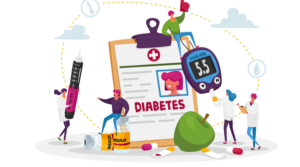There are 463 million adults living with diabetes worldwide. This number is expected to rise to 643 million by 2030 and 783 million by 2045.
India has the second highest number of people living with diabetes in the world. There are an estimated 77 million adults with diabetes in India.

Diabetes is a chronic condition that affects the body’s ability to regulate blood sugar levels. It is essential to recognize the early signs and symptoms of diabetes to seek proper medical attention and manage the condition effectively.
Here are five red flags that may indicate the presence of diabetes:
- Frequent Urination (Polyuria): One of the primary early symptoms of diabetes is frequent urination. When blood sugar levels are high, the kidneys work overtime to filter and absorb the excess glucose. And as a result more urine is produced for more frquent urination. If you find yourself urinating more frequently than usual, especially during the night, it could be a sign of diabetes.
- Excessive Thirst (Polydipsia): Experiencing intense thirst and an unquenchable desire to drink water frequently is another common symptom of diabetes. The excessive urination caused by high blood sugar levels leads to dehydration, triggering the body’s thirst response.
- Unexplained Weight Loss: Sudden and unexplained weight loss can be an early warning sign of diabetes, particularly type 1 diabetes. When the body is unable to produce enough insulin or effectively use it, it begins to break down alternative energy sources, such as muscle tissue and fat, resulting in weight loss.
- Fatigue & Weakness: Persistent fatigue and weakness, even after getting adequate rest, can be a sign of diabetes. When there is insufficient insulin or the body’s cells become resistant to insulin, glucose cannot enter the cells to be used as energy effectively. As a result, the body may feel fatigued and weak.
- Increased Hunger (Polyphagia): Despite consuming regular meals, individuals with diabetes may experience increased hunger. When the body cannot utilize glucose properly, it resorts to breaking down muscle and fat for energy, leading to feelings of hunger.
However, these symptoms may vary in severity and may not always indicate diabetes. Therefore, it is essential to get a proper diagnosis for timely management or treatment.
Your doctor may recommend blood tests, such as fasting blood sugar tests or A1C tests, to determine your blood sugar levels and diagnose diabetes accurately.
Early diagnosis and appropriate management can help individuals with diabetes lead healthy and fulfilling lives while minimizing the risk of complications associated with the condition.

